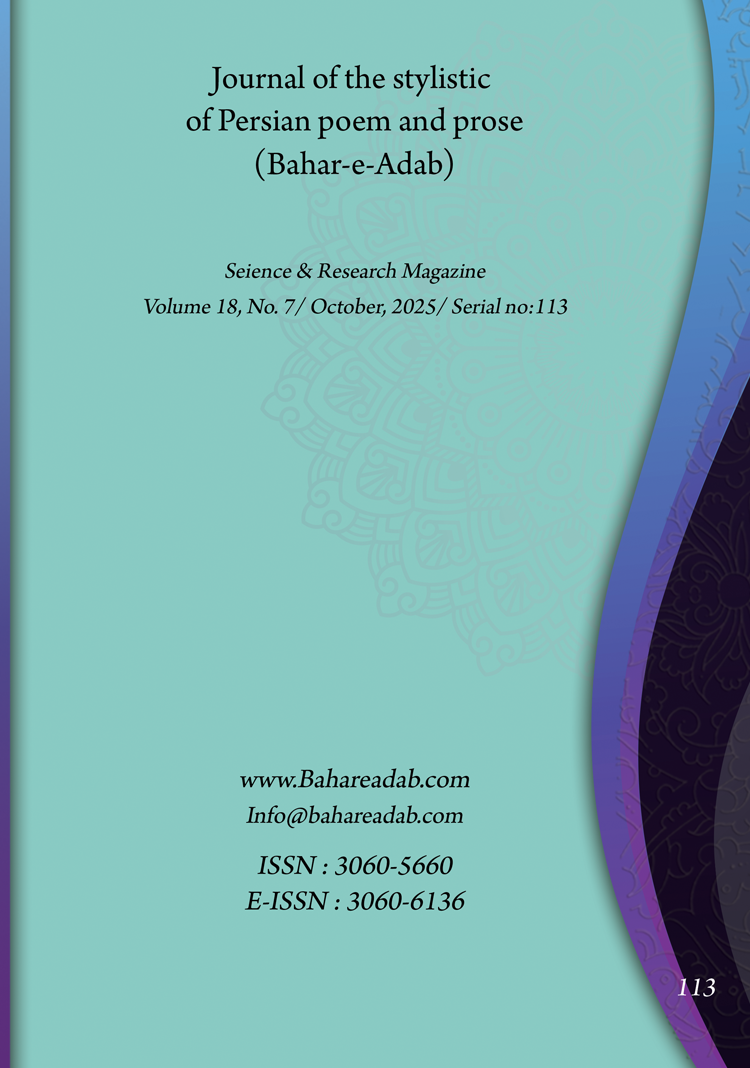- Count View : 222
- آدرس کوتاه شده مقاله: https://bahareadab.com/article_id/1892
- کد DOI مقاله: DOI:10.22034/bahareadab.2025 .18 .7353
Journal of the stylistic of Persian poem and prose
volume Number 18،
number In Volume 7،
،
issue Number 113
An Introduction to the Analysis of Prominent Themes of Situational Humor in the Works of Contemporary Iranian Writers (Based on Three Authors)
Ghahraman Nikravesh , Hafez Sadeghpour (Author in Charge), Zahra Zareei
Abstract
BACKGROUND AND OBJECTIVES: Background and Objective: Humor is one of the important literary genres in the contemporary period, which is divided into two types: verbal and non-verbal. Situational humor is a type of non-verbal humor derived from images, ideas, and concepts that can be a mixture of behavior, situation, scene, and speech; however, the focus of this type of humor is based on the situation that creates it. Situational humor has a special place in fiction and dramatic literature. Therefore, the present study examines situational humor in six fiction and dramatic works by Javad Mojabi, Mahmoud Etemadzadeh, and Bahman Farsi, who have worked in both the fields of drama and story. The main issue of the study was to examine the types of humorous situations and the contexts in which they are created, the techniques used in this way, and their social reflection in order to explain and compare the similarities and differences between these two fields
METHODOLOGY: This study, using a descriptive-analytical method, examines the areas of creating situational humor in the dramatic and fictional works of the authors in question in order to explain and compare their similarities and differences in this field.
FINDINGS: By studying these works, we observed the streaks of situational humor in them, which communicate with the audience by creating various images and an atmosphere mixed with reality. In addition to showing the problems of society in various social, cultural, political, etc. fields, they provide entertainment and recreation for the reader.
CONCLUSION: The results show that the themes of creating situational humor in the field of behavior in stories have a higher frequency than other themes, and then characterization has been the most important topic for writers. Also, writers have used a wider range of these techniques in stories than in plays.
Keyword
Situational humor
, fiction
, drama
, Characterization
- Adams, James Luther. Wilson Yates. (2010). Grotesque in art and literature, translated by Atosa Rasti, Tehran: Nash Qatre, p. 20
- Etemadzadeh, Mahmoud. (1963). Dokhtar Rait, Tehran: Neil, p. 12
- Etemadzadeh, Mahmoud. (1987). Kaveh Tehran: Lal, p. 51
- Bochies, David. (2012). How to make our story humorous. Mohsen Soleimani's translation, the book of secrets and tools of satirical writing, Tehran: Surah Mehr, p. 47
- Zarin Kob, Abdul Hossein. (2008). Aristotle and the art of poetry. Ch6. Tehran: Amir Kabir, p.83
- Soleimani, Mohsen. (2012). Secrets and tools of satirical writing (translation of a collection of articles and interviews with satirists). Tehran: Surah Mehr, p. 66
- Fatuhi, Mahmoud. (2012). Stylology of theories, approaches and methods. Tehran: Sokhon Publications, p. 391
- Fry, Northrop. (1998). Critical analysis. Translated by Saleh Hosseini. Tehran: Nilufar, p. 48
- Farsi, Bahman (1992). Black plant. London: Soil Office, p. 19
- Farsi, Bahman (2015), mouse. Tehran: Bidgol Publishing House, p. 22
- Critchley, Simon. (2005). about humor Translated by Sohail Sommi. Tehran: Qaqnos, p. 50
- Kundera, Milan (2008). The art of storytelling. Translated by Parviz Homayunpour. Tehran: Drop publishing, p. 254
- Mojabi, Javad. (1998). Jim's novel Tehran: Scientific Publications, p. 15
- Mojabi, Javad. (2015). Ghost of Sodom Tehran: Afraz Publications, p. 64
- Mojabi, Javad. (2014). Iranian laughter Tehran: Rozeneh, p. 20
- Makki. Ebrahim (1981), knowing the actors of the show, Tehran: Sedava Sima Publications, p. 116
- Nazerzadeh Kermani, Farhad. (2001). Course booklets on the dramatic aspects of ancient Iranian literature. Tarbiat Modares University. Faculty of Arts, p. 21
- ARTICLES
- Psychologist. Majid (2008), "Tears and Smiles", Cinema Criticism Magazine, Vol. 23, p. 28
- Dairy. Hero (1998), The Humorous Secret, Contemporary Literature Monthly, No. 17 and 18, p. 29
- Kayseri. Abdul Reza, Sarafi. Mohammad Reza (2009), humor in the book Jang-Dashestani, Literary of Sustainability, Number 1, Series, 113, p. 119
- Mohammedans. Morteza (1998), "In the mourning of comedy cinema", Cinema Review Magazine, No. 55, p. 42
- Berry, Edward (2003) ''Laughing at others"’, in “The Cambridge Companion to Shakespearean Comedy”, edited by: Margareta Degrazia and Stanley Wells. Cambridge: Cambridge University Press.,p 123

